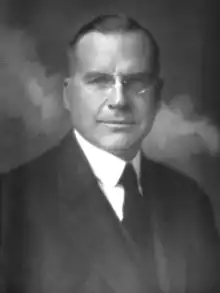
Paul Hastings Allen (28 November 1883 in Boston, Massachusetts – 28 September 1952 in Boston, Massachusetts) was an American composer.
Life
He was born in Hyde Park, a neighborhood of Boston, After being graduated from Harvard College (A. B., 1903), he went to Florence, Italy, where he studied composition with Antonio Scontrino and piano with Giuseppe Buonamici.[1] During World War I, he served in the U.S. diplomatic service. After returning to Boston in 1920, he remained for the rest of his life. He was a prolific composer of operas, symphonies, chamber, and vocal music. He wrote an opera based on The Last of the Mohicans by James Fenimore Cooper. He was awarded a Paderewski Prize for his symphony entitled Pilgrim. Though dated 1909, the prize was awarded in January 1910. Many of his works are in the library at Harvard University.[2]
Works
Operas
- The Monastery (1911)
- It filtro (Genoa, October 26, 1912)
- Milda (Venice, June 14, 1913)
- L'ultimo dei Mohicani (Florence, February 24, 1916)
- Cleopatra (1921)
- La piccolo Figaro (1931)[3]
- I fiori
- The Amaranths
Symphonies
- Symphony No. 1 in G, Al Mare
- Symphony No. 2 in C, Cosmopolitan
- Symphony No. 3 in E, Liberty
- Symphony No. 4 in A, Lyra
- Symphony No. 5 in E, Phoebus
- Symphony No. 6 in D, Pilgrim (received the Paderewski Prize, 1909)
- Symphony No. 7 in E-flat, Somerset
- Symphony No. 8 in D, Utopia.[4]
References
- ↑ Thompson, Oscar (1985). The International Cyclopedia of Music and Musicians, 11th edition. Dodd, Mead & Company.
- ↑ "Paul Hastings Allen manuscript scores, published scores, and other material, 1900-1952". Retrieved 2022-10-28.
- ↑ Slonimsky, Nicolas (1992). Baker's Biographical Dictionary of Musicians, 8th Edition. Schirmer Books.
- ↑ Butterworth, Neil (1998). The American Symphony. Ashgate.
External links
- Paul Hastings Allen manuscript scores, published scores, and other material, 1900-1952 at Isham Memorial Library, Harvard University
- Free scores by Paul Hastings Allen at the International Music Score Library Project (IMSLP)